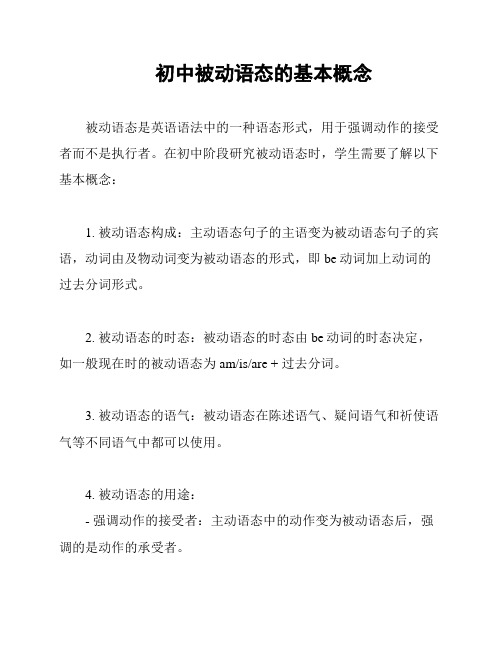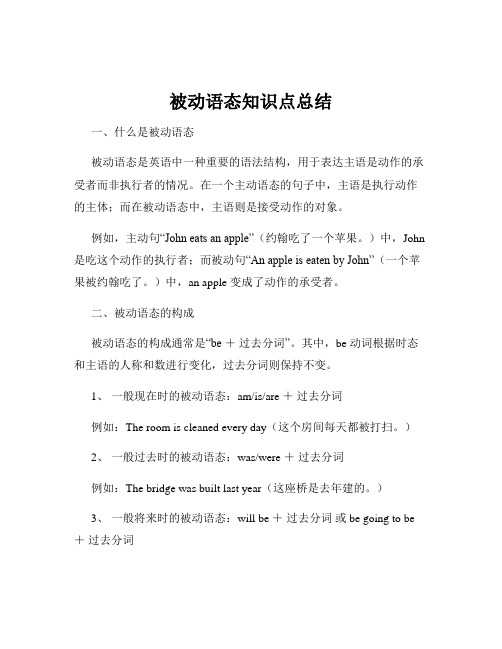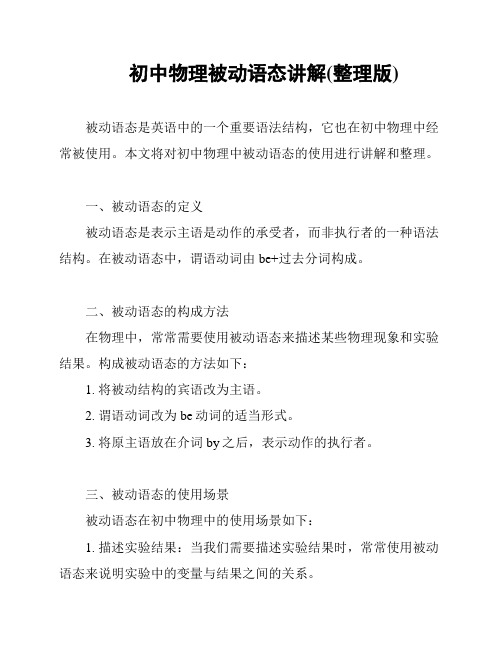第十章 被动语态
新概念第二册第10课被动语态.

被动语态语态是动词的一种形式,它表示主语和谓语的关系。
语态有两种:主动语态和被动语态。
如果主语是动作的执行者,或者是说动作是由主语完成的,要用主动语态;如果主语是动作的承受者,或者是说动作不是由主语而是由其他人完成的,则用被动语态。
同一件事情往往可以通过主动句或被动句来表达,侧重点虽有所不同,但意思基本相同,一般来说,主动语态侧重于行为者,被动语态侧重于动作的对象或动作本身。
一、被动语态的构成被动语态由“be+动词的过去分词”构成。
be随时态、人称和数的变化而变化。
以下就是被动语态在各种时态中的构成。
1. 一般现在时的被动语态:am/are/is+动词过去分词2.一般过去时的被动语态:was/were+动词过去分词3.一般将来时的被动语态:will/shall be+动词过去分词或am/are/is going to be +动词过去分词4.现在进行时的被动语态:am/is/are being+动词过去分词5.过去进行时的被动语态:was/were being+动词过去分词6.现在完成时的被动语态:have/has been+动词过去分词7.过去完成时的被动语态:had been+动词过去分词8.过去将来时的被动语态:would be+动词过去分词9.情态动词的被动语态:情态动词+ be +动词的过去分词歌诀是:被动语态be字变,过去分词跟后面。
下面以open为例,各种时态的被动语态表现为:The door is opened by him every day.(一般现在时的被动语态The door was opened by him yesterday.(.一般过去时的被动语态The door will be opened by him tomorrow.(一般将来时的被动语态The door is being opened by him now.(现在进行时的被动语态The door was being opened by him at 8:00 yesterday evening.(.过去进行时的被动语态The door has been opened by him already.(现在完成时的被动语态The door must be opened by him.(情态动词的被动语态在使用被动语态时,如需要指出动作执行者时,应用“by + 动作的执行者(宾格”二、被动语态的用法:(1 需要强调动作的承受者时English is widely spoken in the world now.(2 不知道或没必要指出动作的执行者时Mr. Wang is invited to the meeting today .(3 当说话人需要强调客观时It is said that she was a beautiful girl when she was young .(4只有及物动词有被动语态,不及物动词没有被动语态。
初中被动语态的基本概念

初中被动语态的基本概念
被动语态是英语语法中的一种语态形式,用于强调动作的接受者而不是执行者。
在初中阶段研究被动语态时,学生需要了解以下基本概念:
1. 被动语态构成:主动语态句子的主语变为被动语态句子的宾语,动词由及物动词变为被动语态的形式,即be动词加上动词的过去分词形式。
2. 被动语态的时态:被动语态的时态由be动词的时态决定,如一般现在时的被动语态为am/is/are + 过去分词。
3. 被动语态的语气:被动语态在陈述语气、疑问语气和祈使语气等不同语气中都可以使用。
4. 被动语态的用途:
- 强调动作的接受者:主动语态中的动作变为被动语态后,强调的是动作的承受者。
- 省略掉执行者或者不知道执行者:有时通过使用被动语态,
可以省略掉执行者或者表示无关紧要。
- 转换句子结构:有时为了改变句子结构或者表达意思的需要,使用被动语态更合适。
5. 被动语态的注意事项:
- 当主动语态的宾语变为被动语态的主语时,要注意动词的过
去分词形式的正确使用。
- 当主动语态中有两个宾语时,只能选取其中一个作为被动语
态的主语。
初中学生在研究被动语态时,需要通过大量的练来加深理解并
熟练运用被动语态的基本概念。
了解被动语态的构成、时态、语气、用途以及注意事项,可以帮助学生更好地掌握和运用被动语态。
第十章被动语态练习

第十章被动语态练习1( ) 1 The People's Republic of China ___ on October 1, 1949.A. foundB. was foundedC. is foundedD. was found ( ) 2 English ____ in Canada.A. speaksB. are spokenC. is speakingD. is spoken ( )3 This English song___ by the girls after class.A. often singsB. often sangC. is often sangD. is often sung( ) 4 This kind of car ___ in Japan.A, makes B. made C. is making D. is made( ) 5 New computers ___ all over the world.A. is usedB. are usingC. are usedD. have used 2( ) 1 Our room must ___ clean.A. keepB. be keptC. to be keptD. to keep ( ) 2 -I'd like to buy that coat.-I'm sorry. ___.A. it soldB. it's sellingC. It's been soldD. it had been sold( ) 3 A new house ___ at the corner of the road.A. is buildingB. is being builtC. been builtD. be building( ) 4 The key ___ on the table when I leave. A. was left B. will be left C. is left D. has been left( ) 5 Doctors ___ in every part of the world. A. need B. are needing C. are needed D. will need ( ) 6 His new book___ next month.A. will be publishedB. is publishingC. is being publishedD. has been published3( ) 1 Japanese ___ in every country.A. is not spokenB. are spokenC. is speakingD. is not speaking( ) 2 These papers___yet.A. have not writtenB. have not been writtenC. has not writtenD. has not been written ( ) 3 The sports meet ___ be held until next week.A. didn'tB. won'tC. isn'tD. doesn't4( ) 1 -My shoes are worn out.A. Can't they be mended?B. Let me have a look at it.C. How much do they cost?D. Can't they mended? ( ) 2 ___ the watch been repaired yet? I badly need it.A. DoesB. HasC. IsD. Are( ) 3 ___ these desks be needed?A. WillB. AreC. HasD. Do5( ) 1 Why ___ to talk about it yesterday? A. didn't a meeting hold B. wasn't a meeting held C. wasn't held a meeting D. a meeting wasn't held ( ) 2 Who was the book___?A. writeB. wroteC. writtenD. written by ( ) 3 Where ___ these boxes made?A. wasB. wereC. isD. am6( ) 1 The flowers___often.A. must be waterB. must be wateredC. must wateredD. must water( ) 2 The books may___ for two weeks.A. be keptB. be borrowedC. keepD. borrow ( ) 3 The broken bike____ here by Mr Smith. A. can mend B. can mended C. can be mend D. can be mended7( ) 1 The old bridge in my hometown___ next month.A. is going to be rebuiltB. will rebuiltC. are going to be rebuiltD. are going to rebuilt ( ) 2 The play ___ at the theatre next Sunday.A. is going to be shownB. will shownC. will showD. is shown( ) 3 The old stone bridge ___ next week.A. is going to be rebuiltB. will be rebuildC. are going to be rebuiltD. will rebuild8( ) 1 Now these magazines___ in the library for a long time.A. have keptB. are keepingC. have been keepingD. have been kept( ) 2 The pot ___ for ___ hot water.A. used; keepingB. was used; keepingC. is used; to keepD. are used; keep( ) 3 Tea ___ in the south of China.A. growsB. is grownC. were grownD. will grow ( ) 4 The bridges___ two years ago.WO It's a Haidian top problemA. is builtB. builtC. were builtD. was built ( ) 5 Wet clothes are often ___ up near a fire in rainy weather.A. hangB. hangedC. hangingD. hung9( ) 1 The river smells terrible. People must ___ dirty things into it.A. be stopped to throwB. be stopped from throwingC. stop to throwD. stop from throwing( ) 2 The teapot ___ water.A. is filled withB. filled ofC. fulling ofD. filled( ) 3 Old people must be looked ^fter well and ___ politely.A. speak toB. spokenC. speakD. spoken to( ) 4 Old people must ___.A. look after wellB. be looked well afterC. looked well afterD. be looked after well 10( ) 1 Newly-born babies___in hospital.A. are taken good careB. are taken good care ofC. take good care ofD. take good care( ) 2 They were___ at the sudden noise.A. frighteningB. frightenedC. frightenD. frightens( ) 3 These walls___stone.A. are made ofB. made of uC. are made intoD. made into11( ) 1 Jane ___ to sing us an American song last Saturday.A. calledB. was askedC. toldD. was said ( ) 2 The papers ___ to them.A. were shownB. showC. shown /D. have shown ( ) 3 The coat___her sister.A. made toB. were made forC. was made forD. was made to12( ) 1 I ___ five minutes to decide whether I should go or not.A. gaveB. was givingC. had givenD. was given ( ) 2 Good care____such things.A. should take ofB. should be takenC. should be takingD. should be taken of ( ) 3 She will____good care____.A. take; ofB. be taken; ofC. take; for youD. be taken; of you13( ) 1 The teacher made him___ his homework. A. to do B. do C. did D. done( ) 2 The boy___ streets without pay in the old days.A. was made to cleanB. made cleanC. made to cleanD. was made clean( ) 3 These children____dance.A. were seen toB. were seen forC. were seenD. saw to14( ) 1 These stones___well.A. are fittedB. fitC. fitsD. is fitted ( ) 2 The bike ___ 500 yuan.A. was costB. costedC. costD. is costed ( ) 3 The important meeting ___ on a cold morning last year.A. was'hadB. was heldC. heldD. had15( ) 1 Great changes___ in the past ten years in China.A. took placeB. have taken placeC. were taking placeD. had taken place ( ) 2 You can't use the computer, it____.A. was broken downB. is wrongC. is badD. has broken down( ) 3 Great changes___in our country during the past 20 years.A. have happenedB. happenedC. have been happenedD. were happened( ) 4 The watch has often ___ down.A. satB. lainC. brokenD. fell16( ) 1 Please pass me another cup. This one___.A. is brokenB. is breakingC. brokeD. broken ( ) 2 The story books___ by the writer in the 1960s.A. are writtenB. were writtenC. are writingD. were writing( ) 3 What time ___ the door ___ every day?A. does; closedB. does; closeC. is; closedD. /; close17( ) 1 Can he___himself?A. get dressB. get dressedC. gets dressedD. instead of( ) 2 He fell from his bike and ___.A. is hurtB. gets hurtC. got hurtD. hurt ( ) 3 Lookout, please keep away from the fire, or your trousers will__A. burntB. burnC. burningD. get burn18( ) 1 The apple___very sweet.A. is tastedB. taste -C. tastesD. are tasting ( ) 2 You___ more beautiful in the light blue shirt.A. seeB. watchC. lookD. look at( ) 3 What you said ___. like a good idea.A. heardB. listenedC. soundD. sounded19( ) 1 -What do you think of the TV play?-Wonderful. It is worth___ a second time.A. watchingB. watchedC. seenD. seeing( ) 2 How dirty the tables are! They need___. A. to clean B. clean C. cleaning D. cleaned ( ) 3 The book is worth ___.A. seeingB. readingC. seenD. read。
初中英语知识点归纳被动语态的构成和用法

初中英语知识点归纳被动语态的构成和用法被动语态是英语中的一种语法结构,用来强调动作的接收者而不是执行者。
在被动语态中,句子的主语是动作的接收者,而不是执行者。
使用被动语态可以改变句子的语气和结构,使表达更加灵活和多样化。
本文将归纳初中英语中的被动语态的构成和用法。
一、被动语态的构成被动语态的构成由"be"动词和过去分词构成。
根据时态的不同,"be"动词有不同的形式。
下面是不同时态下的被动语态构成:1. 一般现在时态:am/is/are + 过去分词(-ed形式或第三人称单数形式)例如:- The book is written by him.这本书是他写的。
- The door is opened by Tom.门是汤姆打开的。
2. 一般过去时态:was/were + 过去分词例如:- The letter was sent yesterday.这封信昨天被寄出了。
- The cake was made by my mom.这个蛋糕是我妈妈做的。
3. 一般将来时态:will be + 过去分词例如:- The package will be delivered tomorrow.这个包裹将会在明天被送到。
- The decision will be made by the committee.决定将由委员会做出。
4. 现在进行时态:am/is/are being + 过去分词例如:- The house is being cleaned by the maid.这所房子正在被女佣清理。
- The project is being discussed by the team.这个项目正在团队讨论中。
5. 过去进行时态:was/were being + 过去分词例如:- The car was being repaired last week.这辆车上周正在维修。
被动语态讲解

过去时被动语态
构成方式
be动词的过去式( was/were)+过去分词
用法
表示过去的动作,强调动 作承受者
例句
The window was broken by the boy.(窗户被那个 男孩打破了。)
将来时被动语态
构成方式
01
will be+过去分词
用法
02
表示将来的动作,强调动作承受者
例句
将主动句中的动词变 为被动形式(be + 过去分词)。
保留原句主语作为by短语出现情况
当需要强调动作的执行者时, 可以保留原句主语作为by短语 出现。
当被动句的主语是泛指或不明 确时,可以保留原句主语作为 by短语来明确动作的执行者。
当需要对比主动句和被动句时 ,可以保留原句主语作为by短 语来保持句子的一致性。
03
不要过度使用被动语态 ,以免导致句子显得生 硬、不自然。
04
在某些情况下,主动语 态和被动语态可交替使 用,以达到不同的表达 效果。
04 被动语态转换技 巧及实例分析
将主动句转换为被动句方法论述
找出主动句中的宾语 ,将其作为被动句的 主语。
将主动句的主语作为 被动句的by短语出现 ,或者省略by短语。
过去分词是动词的一种形式,用于 表示动作的完成或被动。在被动语 态中,过去分词与助动词be一起 构成谓语。
主语
被动语态中的主语通常是动作的承 受者,而不是执行者。主语可以是
名词、代词、数词等。
宾语(可选)
在某些情况下,被动语态中也可以 包含宾语,用于进一步说明动作的 对象或结果。但宾语不是被动语态
的必要成分。
被动语态讲解
目 录
被动语态知识点总结

被动语态知识点总结一、什么是被动语态被动语态是英语中一种重要的语法结构,用于表达主语是动作的承受者而非执行者的情况。
在一个主动语态的句子中,主语是执行动作的主体;而在被动语态中,主语则是接受动作的对象。
例如,主动句“John eats an apple”(约翰吃了一个苹果。
)中,John 是吃这个动作的执行者;而被动句“An apple is eaten by John”(一个苹果被约翰吃了。
)中,an apple 变成了动作的承受者。
二、被动语态的构成被动语态的构成通常是“be +过去分词”。
其中,be 动词根据时态和主语的人称和数进行变化,过去分词则保持不变。
1、一般现在时的被动语态:am/is/are +过去分词例如:The room is cleaned every day(这个房间每天都被打扫。
)2、一般过去时的被动语态:was/were +过去分词例如:The bridge was built last year(这座桥是去年建的。
)3、一般将来时的被动语态:will be +过去分词或 be going to be +过去分词例如:The sports meeting will be held next week(运动会将在下周举行。
)The party is going to be organized by them(聚会将由他们组织。
)4、现在进行时的被动语态:am/is/are + being +过去分词例如:The problem is being discussed now(这个问题正在被讨论。
)5、过去进行时的被动语态:was/were + being +过去分词例如:The machine was being repaired at that time(那时候机器正在被修理。
)6、现在完成时的被动语态:have/has been +过去分词例如:The work has been finished(工作已经完成了。
初中物理被动语态讲解(整理版)

初中物理被动语态讲解(整理版)被动语态是英语中的一个重要语法结构,它也在初中物理中经常被使用。
本文将对初中物理中被动语态的使用进行讲解和整理。
一、被动语态的定义被动语态是表示主语是动作的承受者,而非执行者的一种语法结构。
在被动语态中,谓语动词由be+过去分词构成。
二、被动语态的构成方法在物理中,常常需要使用被动语态来描述某些物理现象和实验结果。
构成被动语态的方法如下:1. 将被动结构的宾语改为主语。
2. 谓语动词改为be动词的适当形式。
3. 将原主语放在介词by之后,表示动作的执行者。
三、被动语态的使用场景被动语态在初中物理中的使用场景如下:1. 描述实验结果:当我们需要描述实验结果时,常常使用被动语态来说明实验中的变量与结果之间的关系。
2. 说明物理现象:被动语态也常用于说明某些物理现象的发生过程,特别是一些与外界因素有关的现象。
四、被动语态的例子以下是初中物理中的几个例子,展示了如何使用被动语态来描述实验结果和物理现象:1. 光的折射现象可以通过改变光的入射角来研究。
(The phenomenon of light refraction can be studied by changing the angle of incidence.)2. 实验中使用的材料应该被标记好,以便识别。
(The materials used in the experiment should be labeled for identification.)3. 磁铁可以吸引铁矿石。
(The magnet can attract iron ore.)通过以上的讲解和例子,我们可以更加清楚地了解在初中物理中如何正确运用被动语态来描述实验结果和物理现象。
希望本文对初中物理研究有所帮助。
(字数:290)。
被动语态ppt课件完整版

一般现在时、过去时、将来时
一般现在时被动语态
am/is/are + 动词过去分词,表示经 常性或习惯性的动作,或与现在事实 相联系的情况。
一般将来时被动语态
will be + 动词过去分词,表示将来某 一时间要发生的动作或存在的状态。
一般过去时被动语态
was/were + 动词过去分词,表示过 去某一时间发生的动作或存在的状态 。
议上讨论。)
动词形式变化规则
现在进行时
am/is/are being+过去分词。例如:The house is being repaired. (房子正在修理中。)
过去进行时
was/were being+过去分词。例如:He was being operated on when we arrived.(我们到达时他正在接受手术。)
情态动词后接完成式时,有时也可以表示虚拟语气,表示与 过去事实相反的假设或愿望。在这种情况下,句子通常使用 倒装语序,即把情态动词放在主语之前。
05Байду номын сангаас
误用与避免方法探讨
常见误用类型分析
主谓不一致
在被动语态中,主语通常是动作的承受者,谓语应与主语保持一致。然而,有时会出现主 谓不一致的错误,如“The book was wrote by him.”(正确形式应为“The book was written by him.”)
如果不定式前面的名词是对句子的主语的特点进行的说明的时候,使用不定式的主 动语态表示被动含义。
在there be句型中,当动词不定式修饰名词作定语时,不定式用主动式作定语,重 点在人。
动名词作主语或宾语补足语时
动名词作主语时,谓语动词为单数,在动名词和不定式中,作为介词的宾语是动 名词,动名词的否定直接在其前加否定词,通过代词的宾格或所有格形式给出逻 辑主语。
- 1、下载文档前请自行甄别文档内容的完整性,平台不提供额外的编辑、内容补充、找答案等附加服务。
- 2、"仅部分预览"的文档,不可在线预览部分如存在完整性等问题,可反馈申请退款(可完整预览的文档不适用该条件!)。
- 3、如文档侵犯您的权益,请联系客服反馈,我们会尽快为您处理(人工客服工作时间:9:00-18:30)。
第十章被动语态一、被动语态的结构[高考试题传真]1. In some parts of the world, tea ______with milk and sugar.(1993)A. is servingB. is servedC. servesD. served2. The water will be further polluted unless some measures______. (1992,上海)A. will be takenB. are takenC. were takenD. had been taken3. I need one more stamp before my collection ____. (1994)A. had completedB. completesC. has been completedD. is completed4. Doctors ________ in every part of the world. (1986)A. needB. are needingC. are neededD. wilt need5. I ________ ten minutes to decide whether I should reject the offer.(1989)A. gaveB. was givenC. was givingD. has given6. If city noises_______from increasing, people________ shout to be heard even at dinner table20 years from now.(1992)A. are not kept; will have toB. are not kept; have toC. do not keep; will have toD. not keep; have to7. Visitors________not to touch the exhibits. (2001)A.will requestB.requestC.are requestingD.are requested被动语态表示主语是动作的承受者。
被动语态是由“助动词be+及物动词的过去分词”构成的。
被动语态主要用于两种情况:1.不知道动作的执行者,或没有必要指出谁是动作的执行者时;2.需要强调动作的执行者时。
教你巧学巧记:当说话人强调或特别关心的是行为对象,即主动句中的宾语,或没有必要说出行为者是谁就用被动语态。
其构成是用助动词be加上动词的过去分词。
在被动句中语法上的主语是行为的承受者,而实际上的主语可用介词by来引导。
据此编成如下顺口溜:(1)动作谁做的不知道,说出谁做的不必要,接受动作者要强调,用被动语态最为妙。
(2)被动特点强调宾(语),用be加上过去分(词),行为对象做主语,逻辑主语by引。
(3)被动不离“be”“p.p.”,主谓一致莫忘记,句中时态要留意,“进行”易漏一个“be”。
例如:(1)Such books are written for children.→A new railway is being built.(2)We love the Party. →The Party is loved by us.(3) They were cleaning their classrooms. →Their classrooms are being cleaned by them.英语中的五个基本句型中,只有三个可以用于被动语态。
(一)单宾语及物动词的被动语态在一般情况下,将主动句中的宾语变为被动句的主语,动词变为被动语态,主动句的主语变为助的宾语,但时短语可以不要。
如:They found a wallet in the car.他们在车中捡到一个钱包。
→A wallet was found in the car.钱包是在车中捡到的。
(二)双宾语及物动词的被动语态有些动词(如:give,tell,buy等)在句中做谓语时可有两个宾语(直接宾语和间接宾语),又称双宾语。
含双宾语的主动结构变为被动结构时,可以将其中一个宾语变为主语,另一个保留不动。
一般是将主动结构的间接宾语变为被动结构的主语。
当直接宾语变为被动结构的主语时,间接宾语前应加介词to(有时可以省去)或for。
如:My mother gave me a pencil.→I was given a pencil by my mother.或:A pencil was given(to)me by my mother.(介词to可以省略)Father bought me a new coat. →I was bought a new coat.或:A new coat was bought for me.(介词for不可省略)注意:被动句中两个间接宾语对比时,其前的介词to不可省略。
如:This apple is given to me,not to you.这个苹果时给我的,不是给你的。
(三)复杂宾语及物动词的被动语态有些动词后面可以跟“宾语+补足语”结构,这种结构被称作复合宾语。
含复合宾语的主动结构变为被动结构时,只将主动结构中的宾语变为被动结构中的主语,宾语补足语保留不动,这时它就成了主语补足语。
可以充当宾语补足语的有名词、形容词、动词不定式、现在分词和过去分词等。
如:They call her Xiao Gao. →She is called Xiao Gao(by them).He told me to wait for you. →I was told to wait for you(by him).I found him lying on the floor. →He was found lying on the floor(by me).We painted the wall blue.→The wall was painted blue.注意:在主动句中,动词不定式做感官动词(see,watch,hear等)和使役动词(make,have)的宾语补足语,通常省去动词不定式符号to。
但改为被动结构后,要把省略了to再加上。
但当动词是let时,其被动结构中不定式仍不带to。
如:They made him go there alone. →He was made to go there alone.They let John go. →John was let go.(四)带有情态动词的被动语态如果主动句带有情态动词,在变为被动句时,情态动词不变,只是后面的主动词变为被动语态。
如:We must prevent him from going.我们必须阻止他去。
→He must be prevented from going.必须阻止他去。
(五) 主动句如果是带有宾语从句的复合句,也可改为被动语态,且有两种改法。
如:We believed that he was ill. →He was believed to be ill.或It was believed that he was ill.一为不定式结构,二是从句结构。
通常以简洁看,最好改成不定式结构,但如果主从句中的时态先后关系不能得到反映时,就宜使用从句结构了。
如:We know he will make much progress. →He is known to make much progress.该句中的to make much progress不能体现原句中的将来时,如果使用从句结构,矛盾就迎刃而解了。
二、by短语在被动语态中的用法从主动句变为被动句以及被动句的使用,都须涉及“by+行为者”(即by短语)的问题,by 短语有时可省略或不用,有时却不可省略。
By短语究竟在哪些情况下使用,却很难用一两条规则加以概括。
兹分述如下:(一)一般说来,下列情况常常省略by短语。
1.主动句是“主+谓+宾+状”结构时。
如:They built the school in 1962. →The school was built in 1962.2.主动句中含有双宾语时。
如:Tom gave me a book. →A book was given(to)me.3.主动句中含有复合宾语。
如:They heard him come. →He was heard to come.4.主动句中含有宾语从句时。
如:We expect that Mary will win. →Mary is expected to win.或:It is expected that Mary will win.(二)一般说来,下面几种不用by短语。
1.当动作的施事者不可知或不易说出时。
如:A greater number of new books will be published next year.明年将有更多的新书出版。
2.在特定的语境或上下文中,施事者为双方所共知,没有必要说出来时。
如:He was made monitor of the class.他被选为班长。
3.说话人本身是行为者,但出于某种考虑(如为了表示礼貌、措辞婉转等),不愿说出自己是动作的行为者时。
如:You have been told many times not to touch the pictures.已经多次告诉你不要触摸这些照片。
(三)一般地说,下面几种情况不省略by短语。
1.主动句中的主语是句子的强调成分时。
如:Even a child can answer this question. →This question can be answered even by a child.甚至小孩都能回答出这个问题。
2.如果省去by短语,句子意思就不完整或含混不清时。
如:Mr Brown wrote the letter. →The letter was written by Mr Brown.布朗先生写了那封信。
3.汉译英时,用英语表达汉语的“被、由、为……所……”等意思时。
如:美洲为哥伦布于1492所发现。
America was discovered by Columbus in 1492.电话是由贝尔发明的。
The telephone was invented by Bell.4.主动句是以疑问代词作主语的问句时。
如:谁发现了美洲?Who discovered America? →Who was America discovered by?三、by短语在被动句中的位置主动句改为被动句后,原主动句的主语变成了介词by的宾语,与by构成介词短语,即by 短语,在被动句里作方式状语。
